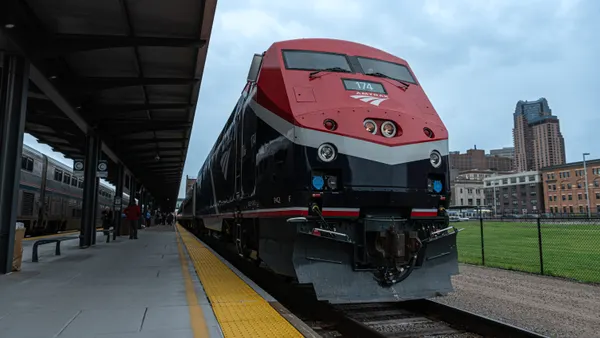Washington, DC and Ford announced an autonomous vehicle (AV) partnership on Monday, a move the pair hopes will also impact areas such as workforce development.
At a press conference, officials said Ford’s AVs will be tested across the District starting as early as the first quarter of next year, with a goal of deploying a commercial AV service in 2021 that could include ride-hailing and food and package delivery. DC joins Detroit, Miami and Pittsburgh as Ford AV test cities.
"Both Ford and district officials are committed to exploring how self-driving vehicles can be deployed in an equitable way across the various neighborhoods that make up Washington, D.C., and in a way that promotes job creation,” Sherif Marakby, CEO of Ford Autonomous Vehicles LLC, wrote in a Medium post.
DC residents will soon see AVs driving test routes across all eight of the city’s wards, mapping its streets, other infrastructure and potential hazards. Ford will also have a terminal for its AVs in the city’s Northeast quadrant, which will serve as its base of operations and a place to develop and house its test fleet.
"We're not just passing through, we're moving in."

Sherif Marakby
CEO, Ford Autonomous Vehicles LLC
And during this testing period, Ford will do research on how residents want to see AVs used, and what would benefit them the most. "We're not just passing through, we're moving in," Marakby said during the press conference.
"Through this partnership with Ford, we can ensure that as self-driving technology advances, we’re introducing it in a way that works for our community and our residents,” DC Mayor Muriel Bowser said in a statement.
The AVs would hit the streets as DC’s existing transportation infrastructure struggles to cope with a slew of ways to get around, and a population that is growing at around 900 new residents a month. Already, the District has seen the popularity of ride-hailing companies Uber and Lyft explode while the public transit system scrambles to keep up.
It has also been a popular spot for dockless bike- and scooter-share, with its pilot program extended twice amid calls from activists to expand it even further, while a robot delivery service won permission to expand earlier this year. But that has created problems with crowded curb sides and gridlocked streets, something DC officials said AVs can help solve.
"As the mayor sometimes says, we're not growing any new roads in the District of Columbia, so we have to learn how to use our existing infrastructure even better,” Brian Kenner, DC’s deputy mayor for economic development, said at the press conference. “Global world class cities have global world class mobility solutions, and autonomous vehicles are certainly one of those."
Meanwhile, Ford and DC officials said the growth of AVs will foster new jobs and education opportunities, in particular thanks to a partnership with the DC Infrastructure Academy, which provides training in various infrastructure fields including energy and utilities and in auto repairs.
Under this agreement, residents will be trained in areas including AV maintenance and operation, preparing them to fulfill jobs like the required safety driver that must sit in the front seat.
"As technology changes the way that we do business, we must also ensure that residents have the skills they need to be ready for the jobs of the future," Kenner said.
"We have to stay focused in our city on how we maintain those technology skills and grow those technology skills right here in DC, and we also have to make the best of our transportation infrastructure," Bowser said at the press conference.












